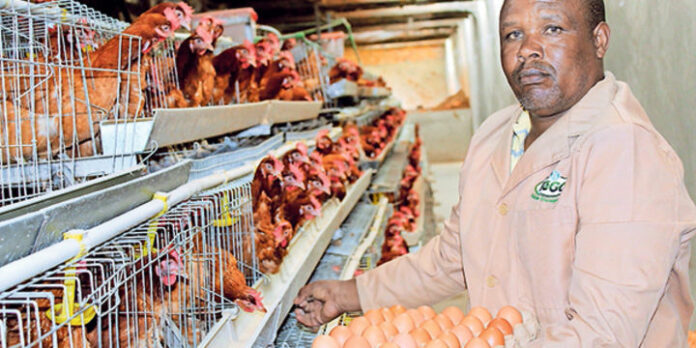At Emitiot Poultry Farm, Daniel Rotich rears some 1,000 layers at any given time.
Rotich first ventured into the agribusiness in 2005 by keeping 50 broilers in a timber structure with a roof of four iron sheets after ploughing Sh4,000.
“For two years, I ran the business from here and sold a cumulative 3,000 birds at Sh250 at hotels in Kisii town, making Sh. 750,000. This motivated me,” he recounts.
However, the 2007 post-election violence forced him to abandon the business after he lacked market for his 300 broilers.
“I started to bake doughnuts and supplied using a bicycle to local trading centres in Bomet, but poultry was where my heart was,” Rotich states.
The farmer returned to poultry farming in 2011. This time round, he went into keeping improved Kienyeji chickens alongside layers, starting with 150 birds.
“I bought 100 day-old layers and 50 improved Kienyeji chicks before raising the numbers to 2,000 birds. Of this, 1,000 were layers and a similar number of improved Kienyeji chicks that I kept under a dip litter system,” says Rotich.
How new CA boss hid at Weston to avoid Sh. 2.2bn tax evasion arrest
But three years later, he dropped the Kienyeji breed due to high cost of feeds and poor market and embraced layers.
It has been a bumpy ride for the farmer, who has taken every failure as a lesson, picked up the pieces and trudged on, before finding his footing in poultry business.
Anne Mwangi: How my dairy farm produces over 1,200 litres of milk per day
He collects 900 eggs from the about 1,000 birds, with the rest yet to reach the laying stage.
“I sell the eggs to traders at Kaplong, Sotik and Kapkatet trading centres for Sh10 each and Sh9 for those who collect from the farm.”
He keeps the birds in cages which he sourced locally, noting the system has made it easier for him to monitor individual bird production levels, feeding and disease control as compared to the dip litter system.
Feeds and water wastage is also very minimal and the farmer can easily follow stock levels with ease in egg collection, while droppings accumulation is monitored and cleaned easily thus guarding against disease outbreak.
On the day of our visit, the farmer had disposed off 1,000 layers and bought a similar number of a month-old chicks to ensure continuity in production.
Water remains the highest consumed commodity on the farm and he harvests rainwater and buys the commodity from vendors during the dry season.
“The 1,000 birds consume 300 litres of water daily. During dry season, I buy 15,000 litres of water from a vendor for Sh4,500 as piped water is not available in our neighbourhood,” says Rotich.
He has a veterinary officer on call while another one from Kenchic visits the farm periodically to advise on the birds’ health, vaccination and treatment in the event of disease outbreak.
“I have educated my children with proceeds from the business, bought a plot at the local trading centre, built a decent house for my family, bought a new tractor and bought a small salon car which I use to supply the eggs to local markets,” says Rotich, noting poultry business is lucrative.
The market for eggs has, however, been shrinking, thanks to cheap imports from Uganda.
“When bird flu broke out in Uganda and the Kenya government banned imports, we did a roaring business supplying eggs to markets in western Kenya at good prices, but when the ban was lifted, we lost the market,” says Rotich.
A version of this profile feature on Daniel Rotich was also published in the Saturday Nation. The Saturday Nation is a publication of the Nation Media Group.










Where can i learn more about chicken farming, if possible from the farmers in it………in gilgil Nakuru county